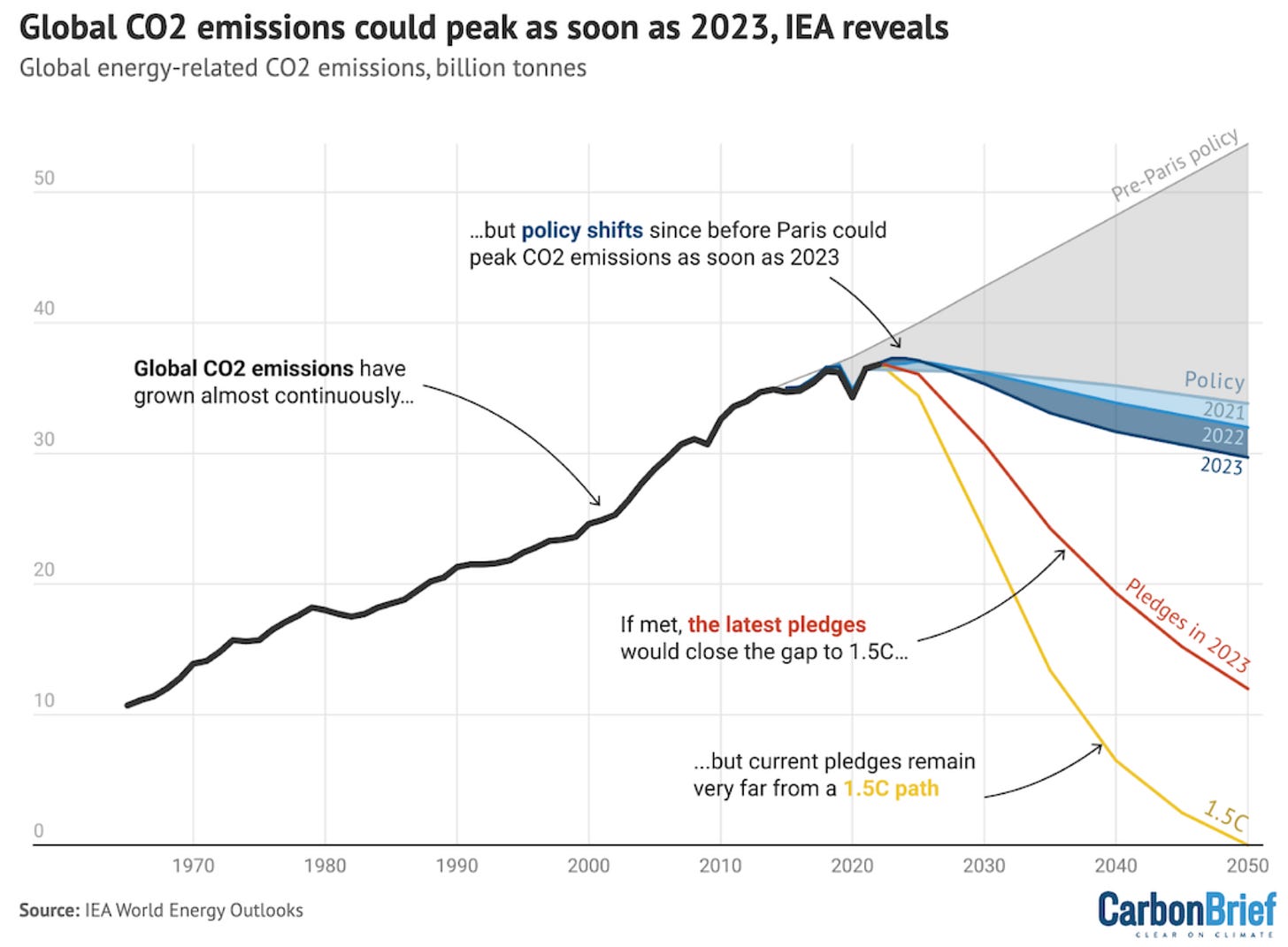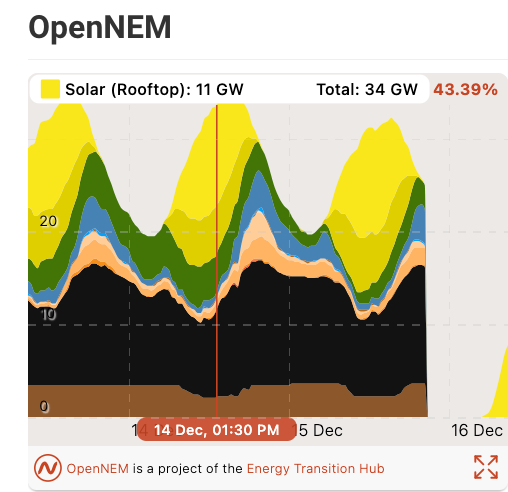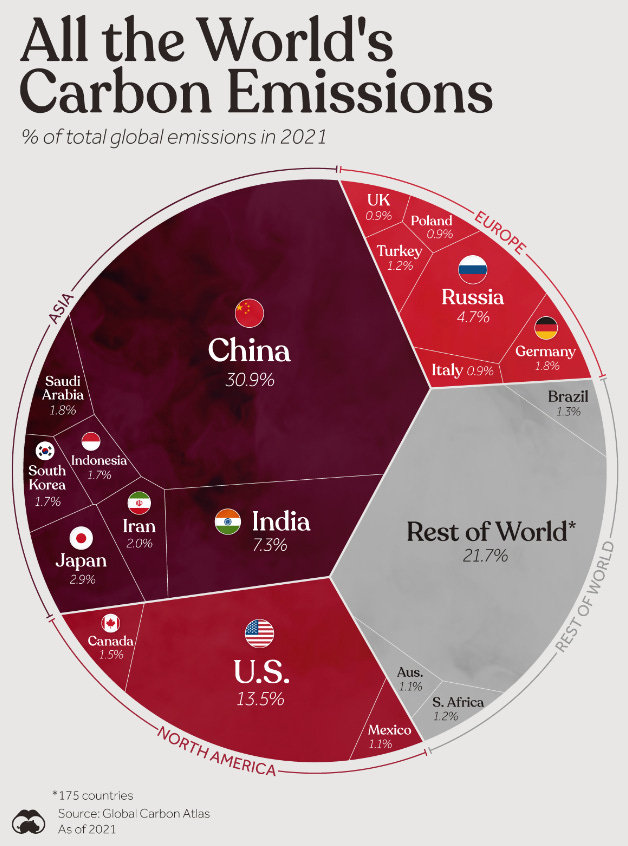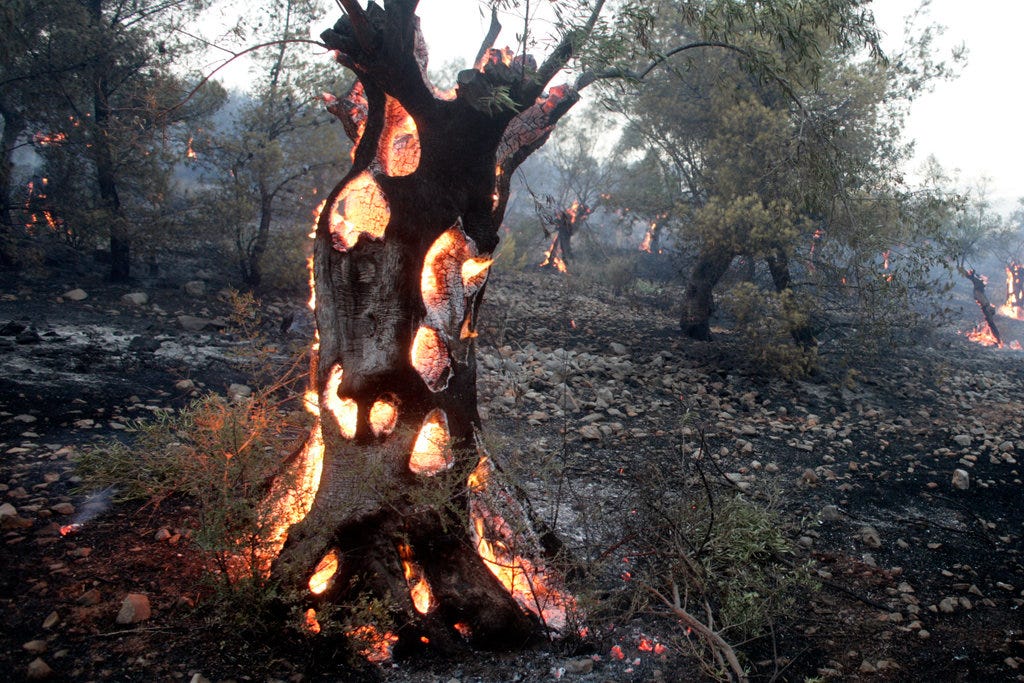2023 was the tipping point
A round-up of the major climate stories from the last 12 months, showing us where we're heading next
For a podcast version of this newsletter, you can listen on Spotify or in your browser.
—————————————
To mark the end of 2023, my brother Chris and I set out to do a little wrap-up of key climate moments from the year.
Chris and I both work in the world of climate and environmental change, but with very different perspectives. Whereas I engage with climate as a theatre artist and storyteller, Chris comes at it as a researcher, public servant and strategist. He’s worked in climate policy at the Australian Department of Finance and the Department of Climate Change, Energy, the Environment and Water.
(He’s also a musician, recording beautiful ambient pop and guitar soundscapes as Fossil Rabbit.)
For this newsletter, we each picked a selection of stories that we think signal big changes, important trends or provide a glimpse of the future.
CHRIS’ SELECTION
Chris: I've chosen three graphs that each illustrate a climate story or trend that is re-shaping our politics and day-to-day lives, slowly tipping us from one climate era into another.
• Global emissions may have peaked
In high school exam papers in future decades, 2023 might end up being remembered as the historical moment when the world finally reached peak emissions. This recent prediction from the International Energy Agency is underpinned by increasing recognition of how the rapid growth in clean energy investment since 2020 was not a blip and is instead starting to crowd out fossil fuel generation across most major economies.
(It's all the more satisfying if 2023 really is the year of peak emissions, given 2022 was a high point for fossil fuel consumption. The invasion of Ukraine caused an immediate energy price shock and the subsequent government support for energy bills helped to contribute to annual global fossil fuel consumption subsidies topping USD $1 trillion for the first time ever.)
The rapid growth in renewable energy investment sparked during COVID continues unabated. Moreover, as inflation reduced over 2023, lithium prices fell which made batteries cheaper. Over the same period, solar PV panels saw major cost declines.
As the graph makes clear, this recent shift should not be mistaken as being in any way commensurate to the scale of the task of the 1.5 degree pathway. But the pathway towards any sort of acceptable final trajectory will have to start with a peak emissions point, and this year is hopefully it.
Prediction: By the end of next year, we've improved the policy pledges line by 50% compared to 2023. Always getting better but never fast enough.
• Solar rooftop dominance
This graph of the electricity generation by energy source data for the Australian east coast grid shows the dominant role of rooftop solar during most sunny days.
The dominance of rooftop solar in the Australian grid, with over half of households now predicted to have rooftop solar by 2030, is arguably Australia's best climate story to showcase to the world. A real-life experiment in how inconspicuous suburban streets can morph over time into becoming a central part of the electricity grid. At the same time shifting power from the major electricity companies towards the consumers-turned-producers.
The economics of the rooftop solar also wreak havoc on the coal power plants. The coal plants, shown in black and brown, are unable to compete with the super cheap electricity generated from solar during the day and so have to ramp up in the evening. As batteries continue to be built in the grid however, much of the daytime solar can be 'shifted' to the evening hours, further depriving the coal plants of revenue opportunities.
The constant need to cut output in the day and ramp back up in the evening exarcerbates the maintenance requirements for coal plants, particularly for the older ones. Rooftop solar has imposed an economic reality that makes the case for investing new domestic coal plants entirely unfeasible. The image of coal generation in the media is also starting to consequently shift. The 2023 image of a coal generator is as a sickly geriatric patient, with media discourse even in conservative media focused around end-of-life options, retirement schedules, support packages or transition funding.
While the roll-out of large-scale solar and wind installations in Australia has been hampered by the relatively slow growth of the transmission network, rooftop solar has done most of the heavy lifting in terms of decarbonising the electricity grid. A great example of citizen-led decarbonisation making real impacts to Australia's emissions trajectory.
Prediction: From cheap solar energy comes many other aspects of the electrified household: heat pumps, induction cooktops and EVs. The steady roll-out of these services provides a new avenue for different sections of society to engage with climate issues, where they may have previously seen climate action as a personal cost. For example, people will capitalise on the ability to avoid petrol/gas costs by instead powering an EV using their rooftop solar.
• Western countries are no longer the driver of climate politics and abatement. Climate change was started by the West, it is Asia that will need to end it.
This chart demonstrates an ongoing trend where by 2030, the giant bloc of developing countries will be responsible for 60% of current emissions and more than half of historic cumulative emissions. The sections containing India and Indonesia, for example, will likely continue growing relative to other countries.
Given the historical link between emissions growth and economic growth, the chart is also a useful illustration of the fragmentation of global power in recent decades.
While the US and China are clearly the dominant countries, many others have sufficient capacity to wield economic power with some independence. We are not quite in the bi-polar 20th century Cold War world, where countries were pulled between two opposing superpowers. Middle-sized countries have much greater capacity to resist being cajoled into a decarbonisation trajectory by a major power.
While the recent COP28 negotiations made some useful headway with the final text declaring the need to transition away from fossil fuels, the divisions also demonstrated the ongoing influence and power of fossil fuel producing countries.
The West has generally not been accustomed to being a bit-player in global affairs. The annual COP events have come to be a candid reflection of these changing dynamics and the US' inability to resolve divisions.
This reality does not absolve the West from the importance of taking a leading role in decarbonisation. It does however mean that the decisions to end the climate crisis will ultimately be taken in the government offices and business boardrooms of Asia.
Prediction: The continued uptake of EVs and the growth of the green hydrogen industry increasingly starts to impact global oil consumption, with knock-on effects for the global dynamics in annual climate negotiations.
DAVID’S SELECTION
David: For me, 2023 was defined by several cultural shifts in climate activism and climate denial, and one massive physical shift in the planetary system.
• Blaming marginalised groups for climate disasters went mainstream
In the Australian bushfires of 2019-20 (what Jack Lloyd calls Bad Summer), rumours began to circulate on twitter that these extraordinary fires had nothing to do with climate change. Instead, these people argued that the fires had been deliberately lit by arsonists.
Who were these arsonists? The commentors weren’t sure, but they had their guesses: ‘I won't be surprised if it turns out the fires were lit by radical environmentalists … to illustrate their malicious sad little point.’
These rumours didn’t get much traction at the time, but in retrospect, they were a test balloon for a climate denier trope that came into full flower in 2023. The extreme fires that have hit at a massive scale this year have been blamed on deliberate arson by Antifa, migrants, refugees, any marginalised group you like.
In Greece, this took on a horrific form over August. Accusations circulated that the country’s massive wildfires were the work of migrant communities, and vigilantes began rounding up migrants off the street and throwing them in the back of vans.
Richard Seymour: ‘The Antifa fantasy is it gives you someone to shoot at. You can’t kill the abstract forces that are killing you. You can’t aim a rifle at capitalism, or climate change. These are large and daunting problems, even larger than the poverty, misery and addictions that are killing your friends, which you also can’t solve. People setting fires in the woods is a human-scaled problem. And it is exciting to be threatened by something you can actually kill.’
Prediction: The disasters are going to keep escalating, and the need for someone to blame will correspondingly grow. Expect to see much more of this tactic.
• Extinction Rebellion and Just Stop Oil mapped out two alternative paths for climate activism
At the end of 2022, Extinction Rebellion announced that it was shifting tactics away from disruptive protest to getting people on the streets. Just Stop Oil, an XR offshoot, continued to prioritise high visibility disruption.
This year, XR achieved its goals of getting a massive number of people on the streets. XR’s ‘The Big One’ set a record for the biggest climate protests in UK history. Over four days in April, more than 100,000 people took to the streets. It was peaceful, it was diverse, it was inclusive - and it was completely ignored by the press. Even the Guardian didn’t give it more than a cursory mention.
The same month, a Just Stop Oil protestor disrupted a snooker tournament. This single photograph got more headlines than the entire two week XR effort. Social media was engaged. The debate was active and lively - mostly criticism, but not entirely.
JSO followed up with a number of high profile stunts - notably, several months ago, they shut down a performance of Les Miserables on the West End.
Meanwhile XR has been grappling with the aftermath of the Big One. Maybe the slow approach of consensus building and growing an alliance will have long-term payoffs, but in the short term, many people within XR saw the failure of the Big One as a mandate to shift to more disruptive tactics.
Prediction: Just Stop Oil’s choice of tactics will spread, and their chosen targets of sports and arts events will increasingly be seen as a low cost / high impact way of gaining attention to the climate cause.
• We crossed the tipping point
Dwarfing every other climate story this year: the news about ocean temperatures.
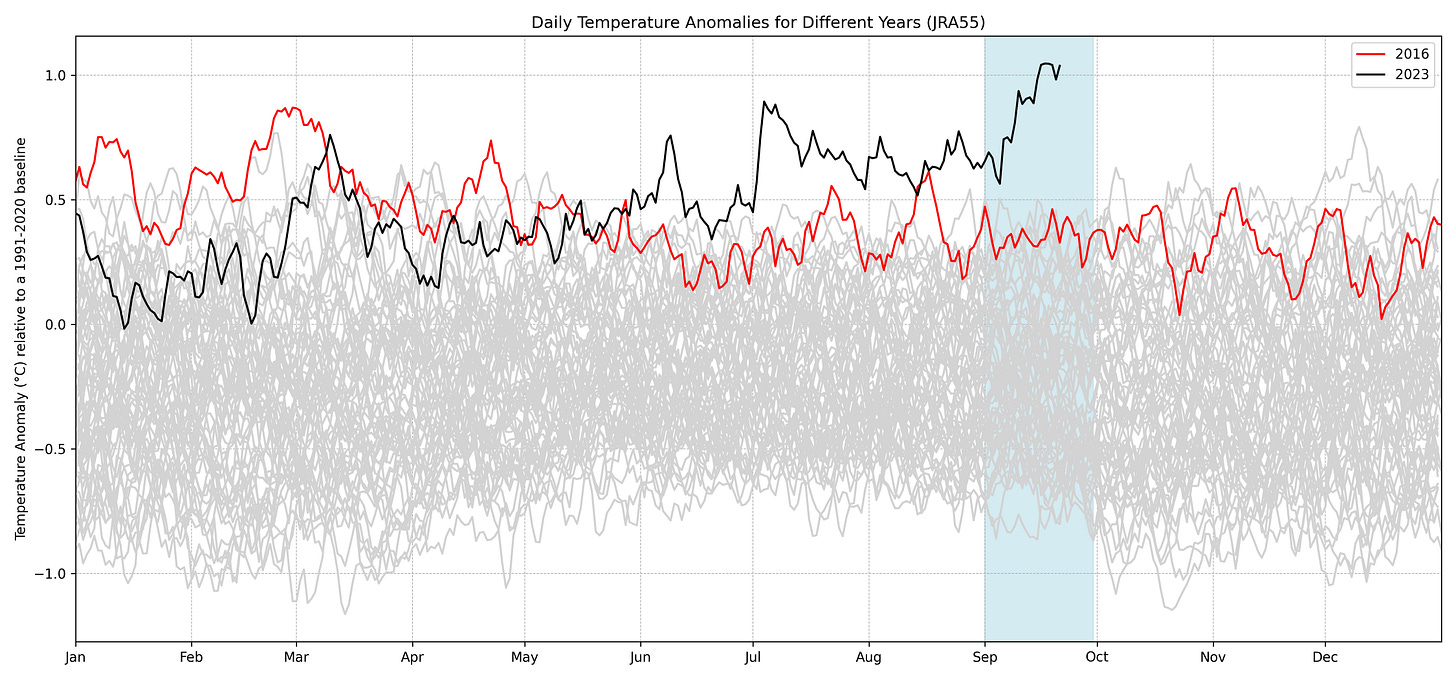
Ocean surface temperatures have risen year after year for most of our lives. Every year there’s a new line on the graph illustrating a broken record. But this year, that record wasn’t just broken - it was smashed.
In June, temperatures escalated by a shocking margin. And they continued to rise, and rise. June, July, August, September, October, November, were all the hottest years on record for the whole planet.
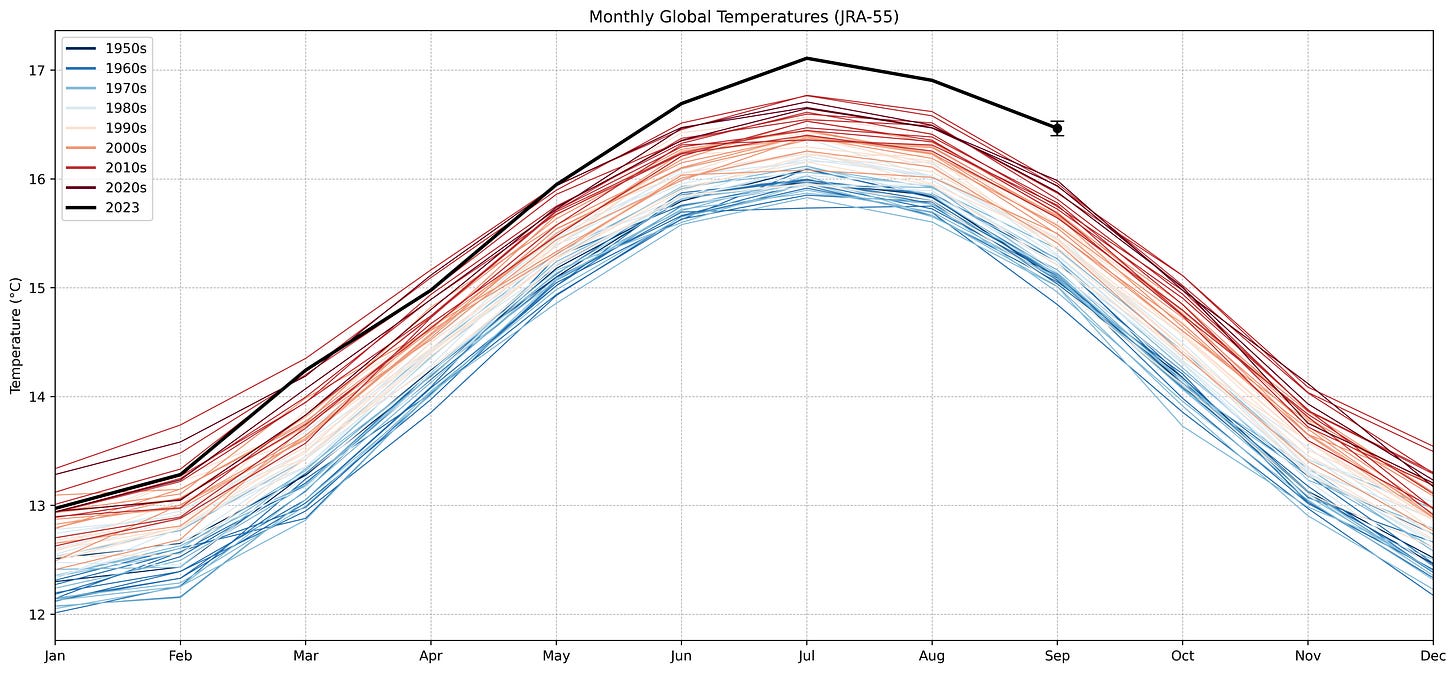
One possible reason might be that pollution in the atmosphere is decreasing. While toxic, this pollution does have the effect of dimming sunlight, and therefore cooling the planet. As the skies clear, temperatures will correspondingly increase.
Zeke Hausfeather has a good breakdown of possible explanations at the Climate Brink - but the overall takeaway is that we’ve crossed the threshold.
Prediction: June 2023 will be regarded as the tipping point. We’re in a new climate regime now, and there’s no going back.
——
There have been many turning points and tipping points in the story of climate change so far, but as Chris says, 2023 feels like a watershed - a year where everything broke loose. The wave is breaking, we’re in the white water now.
Hold tight, everyone. See you in 2024.
————
NEWS AND PROJECTS
Last month I spent a few weeks in NYC, where I undertook a script development of Climate Era at the Cell Theater in Chelsea, and presented a one-off performance of Deep History at the Public. Now I’m in the Philippines, working with my lifetime collaborators in Manila on a new large-scale performance about reality TV talent contests, taking place in 2024. This too huge world, vaulting us.
Scenes from the Climate Era in New Zealand
I’m delighted to announce that Auckland Theatre Company and Silo Theatre are partnering to produce the New Zealand premiere of Climate Era in August 2024. Also: this promo image! I love it so much.
Scripts for sale
Thanks to Karmin Cooper and New Best Friend, I now have an online shop where you can purchase three of my best works: Scenes from the Climate Era, 44 Sex Acts In One Week and Kill Climate Deniers. Dive in!
RECOMMENDATIONS
Joe Muggs - Bass, Mid, Tops
This book of interviews with UK dance music innovators is a total joy - in particular the stories from the 2000s as the UK shifted through Garage, Grime, Dubstep and Funky.
Scuba - Digital Underground
The new record by the post-dubstep producer is superb - and it’s got nothing to do with dubstep, it’s pure early hardcore. I’m a simple creature, but when the beat drops on Feel The Same, my whole heart just swells.
Patricia Evangelista - Some People Need Killing
Evangelista is a Rappler journalist who’s been writing about Duterte’s drug war since 2016. I’ve had this on pre-order since it was first announced, and man it does not disappoint. Precise, skilful and utterly devastating. Highly recommend.
---
As ever, you can get more background on my practice in my New Rules for Modelling series, or you can check out my website. And if you have any questions or offers that might make my life more interesting, feel free to get in touch.
Peace!


